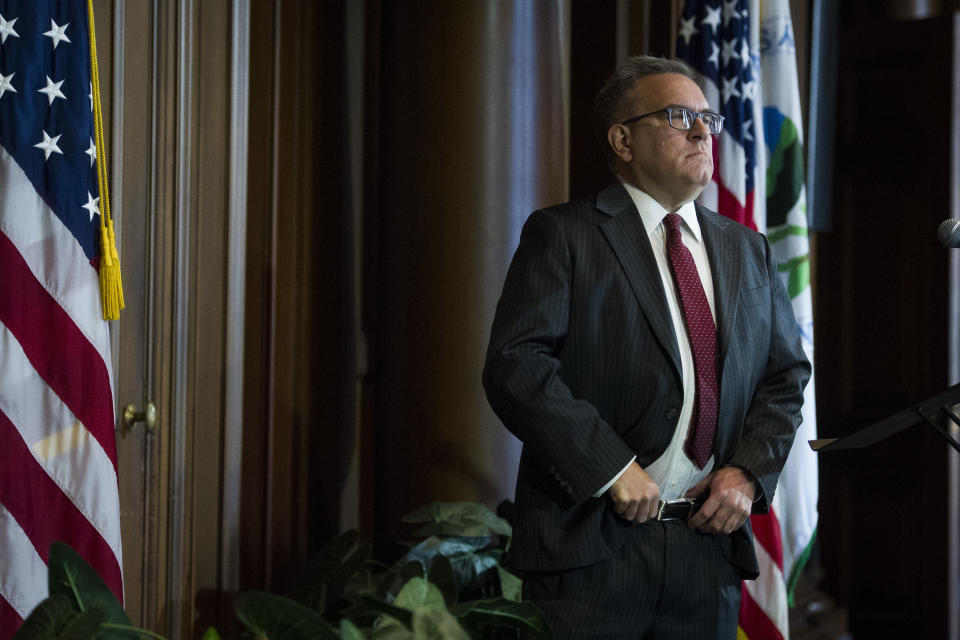Trump EPA moves to kill Obama's clean-air rule to encourage new coal plants
The Environmental Protection Agency announced Thursday that it plans to eliminate a federal clean air rule established under former President Barack Obama in 2015 that required new coal-burning power plants to incorporate advanced technology for lowering carbon emissions.
The Obama-era rule required new coal plants to take advantage of carbon capture and storage technology to cut down emissions of carbon dioxide, a major driver of man-made climate change.
Acting EPA Administrator Andrew Wheeler made the announcement at the agency’s headquarters in Washington, D.C., at 1:30 p.m. He reiterated President Trump’s long-held position that such environmental safeguards are a hindrance to job creation.

“Shortly after President Trump took office, he issued an executive order to promote American energy independence. He directed federal agencies to repeal and replace regulatory burdens that were stifling energy innovation and production. Today we are once again delivering on President Trump’s directive,” Wheeler told the audience.
Under the Clean Air Act 111B, he said, the Trump administration is proposing to replace the Obama EPA’s determination to require carbon capture technology in new plants. He accused the Obama administration of being “disingenuous” and “knowing the technology was not adequately demonstrated.” He said Obama wanted coal removed from the energy mix, rather than encouraging investment in “clean coal technologies.”
Since the Obama administration promulgated the rule, no new coal plants have been built in the U.S., and the technology to scrub carbon dioxide from smokestack gas and store it underground is still experimental.
As world leaders meet in Poland to discuss reducing CO2 emissions, Wheeler expressed hope that his proposal would encourage more “clean coal” use in the U.S. and worldwide.
“Our proposal will replace those onerous, untenable requirements with high yet achievable standards that are rooted in reality,” he said. “We are rescinding unfair burdens on America’s energy providers.”
Wheeler’s proposal is unlikely to have much impact on the declining coal industry amid public pressure for climate action and competition from cleaner energy options like solar and wind.
Scientists and environmentalists say that former coal lobbyist Wheeler — like his predecessor Scott Pruitt — is sabotaging from inside the government the environmental protections he is charged with upholding.
David Doniger, the senior strategic director of the Natural Resources Defense Council’s climate and clean energy program, said that the 2015 rule, which did not have a special name, was just a new source performance standard for electric generating units. He condemned the EPA’s decision.

“This is just one more foolhardy move by a misguided administration that will be judged harshly by future generations,” Doniger said in a statement. “The science is clear: operating large fossil fuel plants without carbon capture and storage is a disaster for the climate. What we need instead is swift and decisive action to curb dangerous climate change.”
Liz Perera, the director of climate policy for the Sierra Club, said the last combination coal and natural gas plant was built in 2014 and the last pure coal plant was built in 2013. She said new coal plants aren’t currently being constructed in the U.S. largely because they are too dirty and expensive.
“The economy chose long before the policymakers did,” Perera told Yahoo News. “If you look at the latest data, coal is at record lows. It’s been a rapid decline, and that’s market-driven.”
Earlier this month, Trump announced he intends to nominate Wheeler as the permanent EPA administrator. The incoming Democratic majority in the House of Representatives is expected to push back against Wheeler’s regulatory agenda.
National representatives from member states of the U.N. Framework Convention on Climate Change are meeting in Katowice, Poland, with the goal of establishing rules for checking that countries are fulfilling the promises they made three years ago under the Paris Agreement.
Phasing out coal plants would have benefits besides curbing global warming. Independent of its impact on climate change, air pollution from a variety of sources, including power plants, kills 7 million people worldwide every year.
Jeremy Hess, a professor of emergency medicine and global health at the University of Washington, said small particulates resulting from the combustion of fossil fuels are the most common and may be the most damaging form of air pollution.
“They have a whole host of adverse health impacts. Their underlying mechanism is that they cause inflammation throughout the body, not just in the lungs where they’re inhaled, but also in your blood vessels and ultimately in tissues throughout your body,” Hess told Yahoo News.
Hess, who is senior author of the brief on climate change and health in the U.S. in the Lancet Countdown, said these particulates increase the risk of cardiovascular disease, including heart attacks and strokes, and are carcinogenic. He said there’s an immediate benefit to public health by cutting back on air pollution.
“When you reduce what you’re putting into the air, it immediately translates into reducing the harmful stuff people are breathing in. Those health benefits accrue pretty much immediately. They take a little while to play out, but not many decades like we’re seeing with climate change.”
_____
Read more from Yahoo News:
Cohen is a ‘serial liar,’ says former Trump aide Lewandowski
Take a number: Migrants, blocked at the border, wait their turn to apply for asylum
An American killing: Why did the U.S. Park Police fatally shoot Bijan Ghaisar?
I called George Bush a ‘wimp’ on the cover of Newsweek. Why I was wrong.
Photos: Texas funeral held for former President George H.W. Bush



